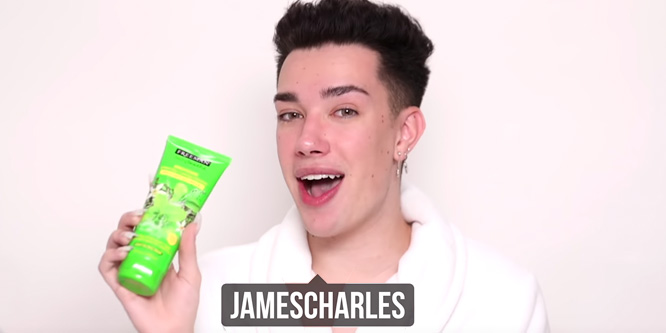
Source: James Charles – “Trying Celebrity Makeup Hacks!”/YouTube
December 13, 2019
Are customers more loyal to brands or influencers?
Wise Marketer Staff
Through a special arrangement, presented here for discussion is a summary of a current article from The Wise Marketer, a website and newsletter serving the global loyalty industry.
Influencers, in many ways, are like the mascots and corporate characters of marketing years gone by. A familiar face to latch on to, they create a personified voice through which to express brand messaging, cultivating a communication experience that is arguably more humanized.
Yet one of the most difficult balancing acts in all of marketing is trying to administer brand control while simultaneously giving influencers the freedom to generate authentic messaging. Almost half of all marketers feel they should have complete control over all written and visual communications within influencer content, according to a recent study from influencer marketing service Takumi.
Many (if not most) influencers also work with several brands simultaneously, and they alone are responsible for amassing a following, rallying their fans and creating their own brand, distinct from any sponsoring entity. Most will not even be considered for a partnership until these prerequisites have been reached. And the “better” the influencer, the more loyal and ardent the followers, but this loyalty is typically prioritized towards the influencer themselves.
The tension between loyalty for influencers and the brands that sponsor them is evidenced in the recent drama between beauty vlogger James Charles and colleague Tati Westbrook. Mr. Charles posted content featuring vitamin brand SugarBearHair, a direct competitor to Ms. Westbrook’s Halo Beauty. Ms. Westbrook decisively admonished Mr. Charles in a 43-minute confessional video, and her fans took retaliatory action by not only unfollowing but disavowing and disengaging from many of Mr. Charles’ associated brands.
Still, influencer marketing meets the fundamental conditions required for successful communication with customers. Information is coming from a trusted source, is packed with entertainment, is easy to access (given its digital nature) and is informative. Influencers also generate an organic call to action, creating demand just by amplifying an individual product.
Influencer marketing creates the opportunity for brands to engage in natural human conversations — but the strategy carries a high quotient of risk that must be managed.
As influencer marketing continues to proliferate, brands may find that without a significant reshaping of their tactical approach, the risks may outweigh the benefits in the pursuit of building long-term loyalty.
- Can Influencer Marketing Advance Loyalty? – The Wise Marketer
- The James Charles Drama Proves That Influencer Marketing Is Still the Wild West – Vanity Fair
- #BrandsGetReal: What consumers want from brands in a divided society – Sprout Social
- Trust deficit leaves half of marketers wanting complete control of influencer marketing posts – The Drum
- Influencer Nation: 86% of Young Americans Want to Become One – Bloomberg
- What Will Influencer Marketing Look Like in 2020? – HubSpot
- The Shocking ROI of Influencer Marketing – Convince&Convert
Discussion Questions
DISCUSSION QUESTIONS: Do you see major conflicts between the tendency for influencers to support themselves vs. their associated brands? Are their simple steps that can be taken to reduce the related risks while seeking to capitalize on their increasing influence?
Poll
BrainTrust
Lee Peterson
EVP Thought Leadership, Marketing, WD Partners
Recent Discussions







We know from the scenario discussed above, which happened this year, that opinion can change on a dime — that is the power of social media. I think you have a double-edged sword. It’s a good thing if they are in step with their base audience — product will sell. However, the tide can turn negative so quickly that the products they support can become unfavorable as fast as you can refresh your browser…
Influencers can absolutely be brands unto themselves. They can be their own free-standing brand. They can have a brand promise. And to the degree they keep that brand promise with integrity, the credibility and strength of their brand promise grows. They can absolutely become the go-to authority for a range of products and/or services. If they veer off and become a paid shill for unrelated products or brands, their credibility and therefore their influence will ultimately fade. Before we called them influencers, we knew them as spokespeople. By any name, they need to be chosen wisely.
Influencer marketing amounts to little more than gambling with your brand. All is well as long as the influencer follows the rules, but since they make up their own rules things often go awry, and the brand takes the hit. Even when things go well, the market’s loyalty is dedicated to the influencer, not the brand. Influencer marketing is best used for short term awareness; it’s not a reliable long-term success strategy.
I’m going to give you an “OK Boomer” moment here: I’ve always been adverse to the whole influencer phenomenon. Yeah, I know it works in some instances but, to me, there’s just way too much risk involved, especially the way anyone can dig up anything on anybody now. Is it worth the vetting that would have to take place vs simply doing the right thing as a brand? I guess many have answered yes to that question and there’s numbers to bear that out. But to me — call this opinion Old School — it sure seems like a passing trend that will fade with the likes of Top 10 K-pop songs and too-skinny jeggings.
I couldn’t agree more Lee. I’ve no trouble understanding an endorsement from a celebrity — an actor, athlete … even a Warren Buffet — in short, people who’ve actually done something and perhaps have a reason to be listened to. But people who have no more qualification than the (often self-crowned) amorphous title of “influencer”? A hired gun without a holster.
I’m not sure the title of influencer is something that’s merely self-crowned. Influencers that make viable partners must have authentically amassed a certain number of non-bot followers and achieved a level of engagement from those followers in order for brands to consider them. These people are YouTube Stars, reality TV personalities, local celebrities, tastemakers, subject matter experts, etc.
Most brands can’t afford to partner with the type of celebrity you’re talking about. Instead, they partner with minor ones who mean something to their target audience and hope for some kick back. In many cases, they don’t even have to pay these people (i.e. they pay with product), which makes the risk pretty low.
Do I think it stands on its own as a viable marketing strategy? No. Am I as an older Millennial particularly swayed by influencer marketing? No. Is it all that different from established tactics like advertorials and native ads? No. Unless social media is disappearing (hey, one can always hope), I don’t see this being a fad.
I don’t personally put much stock in most influencers, but they’re no more or less qualified than a “traditional” celebrity. In fact, quite often the opposite is true. They are fully engaged in their area of interest. They live and breathe those products/brands while actors and athletes will back almost anything (telecommunications, insurance, food/drinks, etc.) whether or not they’re interested in it at all.
Customers follow influencers only so long as their values match, and are further reflected in the brands that influencers endorse. With both brands and influencers, customers will align only with those that align with their values.
If the values of an individual customer, the influencer and the brand they endorse are all congruent, it will work wonders. Any dissonance will mean the influencer will not be as effective.
As influencers get more clout, brands have less and less creative control over the way their product is communicated when they partner when them. Brands who want to exact more control can partner with nano- and micro-influencers, who are still working to establish themselves and developing their personal brands and are therefore more likely to adhere to brands’ standards. Sure, these smaller influencers have fewer followers but their followers also tend to trust them more. This means greater potential ROI and reducing risk for their brand partners.
If your customers are more loyal to your influencers than your brand, good luck. It’s another form of buying business in the most transactional ways and it’s the perfect strategy to reduce your profits. You need your customers and your influencers loyal to your brand in order to succeed with any degree of sustainable profit growth; of course you can do without the latter but not without the former.
Paid influencers will be in alignment with a brand. And, the influencer must promote a product they believe in and is truthful in their description. Anything less will harm the reputation of both parties. A risk to consider: If you’re going after a certain segment and choose to use an influencer, make sure that influencer isn’t offensive or can hurt the reputation for your other clients.
Well, when the brand and the influencer are the same, (e.g., Kylie Jenner) the sky is truly the limit. Otherwise, social brand influencers tend to be short-term in effectiveness.